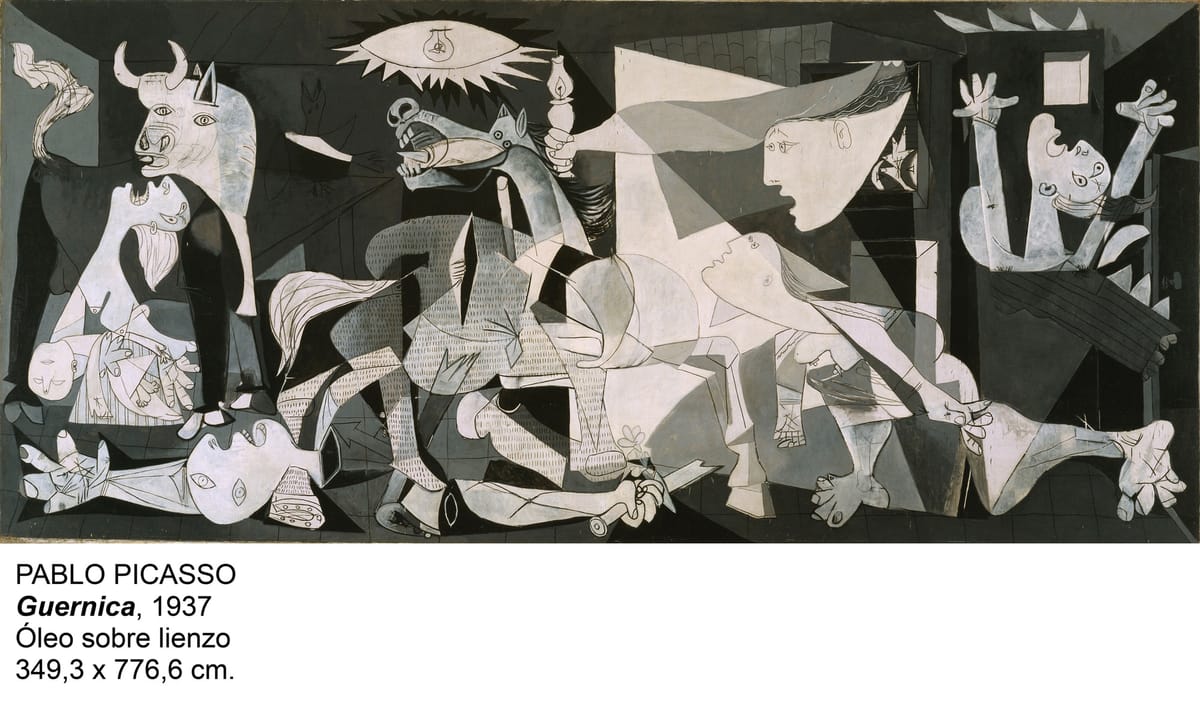“The Artist Must Take Sides”: Paul Robeson Against Fascism

When the Luftwaffe bombed Guernica in April 1937, it was a deliberate attack on the civilians of a town that represented Basque freedom. It also contributed to the displacement of thousands of children, who became known as the Basque refugee children. They were evacuated to Britain, Belgium, the Soviet Union, Mexico, and other European countries. Britain took in almost 4,000 children, under pressure from the National Joint Committee for Spanish Relief (NJCSR), a voluntary aid organization that coordinated relief efforts for victims of the Spanish Civil War.
The NJCSR counted scores of artists and celebrities among its volunteer ranks and supporters. The program for their June 24, 1937 fundraising event, “Spain and Culture, in aid of Basque refugee children,” attests to the centrality of art and artists to their mission. Pablo Picasso gave them a study for his painting responding to the horror of the Guernica bombing, which became the cover of the event program.

Picasso spoke at the event, which was held at Royal Albert Hall and was supported by Virginia Woolf, Vanessa Bell, E.M. Forster, and other members of the Bloomsbury group, Harold Nicolson (husband of Vita Sackville-West), and H.G. Wells.

And, through the magic of radio, so did Paul Robeson. The American actor and activist, who would later come under fire from the House Un-American Activities Committee for his direct ties to communism, spent some of 1937 in Moscow, where he later said he felt “like a human being for the first time in my life.”
“Broadcast direct to the meeting” from Moscow, Robeson spoke passionately about the need for artists and scientists to take sides in the global conflict between fascism and freedom:
Every artist, every scientist, every writer must decide now where he stands. He has no alternative. There is no standing above the conflict on Olympian heights. There are no impartial observers. The battle front is everywhere. There is no sheltered rear.
[…]
The artist must take sides. He must elect to fight for freedom or for slavery. I have made my choice. I had no alternative. The history of this era is characterized by the degradation of my people. Despoiled of their lands, their culture destroyed, they are in every country save one [the USSR], denied equal protection of the law, and deprived of their rightful place in the respect of their fellows.
[…]
Again I say, the true artist cannot hold himself aloof. The legacy of culture from our predecessors is in danger. It is the foundation upon which we build a still more lofty edifice. It belongs not only to us, not only to the present generation — it belongs to posterity — and must be defended to the death. May you rally every artist, every scientist, every writer in England who loves democracy. May you rally every black man to the side of Republican Spain.
May your inspiring message reach every man, woman, and child who stands for freedom and justice. The liberation of Spain from the oppression of fascist reactionaries is not a private matter of the Spaniards, but the common cause of all advanced and progressive humanity.
(Paul Robeson Speaks, 118–119)
Robeson’s speech connects the fight against fascism with his own experience of racism and class struggle around the world. It is an articulation of a global justice movement that saw the intersections of race, class, and violence, and the need to build broad coalitions for freedom and peace.
I haven’t found a recording of this speech, but Robeson’s booming voice must have been stirring. His contemporaneous film appearances demonstrate the power of his speech (and song). When Robeson sings “Walk! Walk!” and “Climbing Up,” in 1937’s King Solomon’s Mines, the spirituals transcend the movie’s literalness and reclaim those moments to remind us of something bigger. “I’m not afraid, I’m not afraid,” Robeson sings, “why should I care if my journey’s long?”
Like all good spirituals, these songs link the African and African-American experience with Moses, with the enslavement of the Israelites and with Exodus. It shouldn’t surprise anyone that they were written by Mischa Spoliansky and Eric Maschwitz, Jewish musicians living in Britain (Maschwitz was born there, but Spoliansky was in exile after fleeing Hitler’s Germany in 1933).
Paul Robeson made several films in 1936 and 1937, the same years he was visiting Russia and speaking against fascism in England. These include Show Boat, with Robeson’s famous rendition of “Ol’ Man River”; Big Fella, loosely based on a Claude McKay novel; King Solomon’s Mines, mentioned above; and Jericho, which has been described as a response to the fascist Italian invasion of Ethiopia.
Robeson returned to America at the outbreak of World War II, where he continued his work as an activist for civil rights. He was targeted by the FBI for his support of the Soviet Union, blacklisted, had his passport revoked, and called HUAC out for being “fascist-minded people” who would not drive him from the country his father had helped to build as a slave.
In his art and his activism, Robeson was always unafraid to take a side.
~~~~~
Thank you to J. Ashley Foster for her paper, “Bloomsbury Projects for Peace,” through which I learned about Paul Robeson’s connection to the NJCSR.
Sources:
“Grand International Meeting on Spain and Culture (leaflet).”
“Paul Robeson.”
“The Film Music of Mischa Spoliansky.”
“‘You Are the Un-Americans, and You Ought to be Ashamed of Yourselves’: Paul Robeson Appears Before HUAC.”
